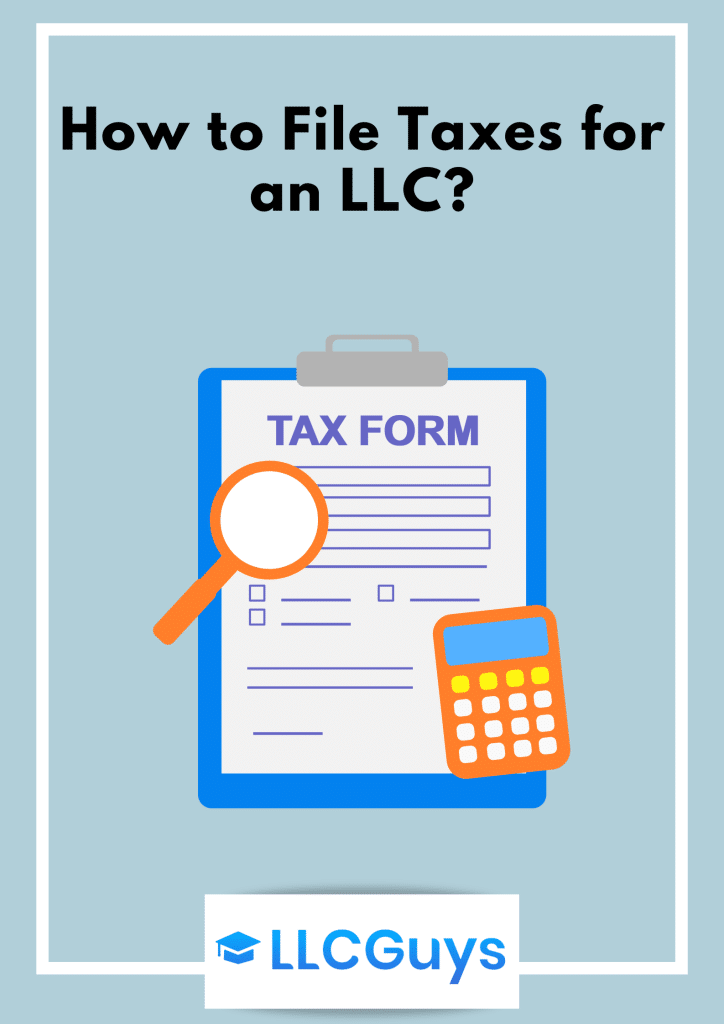How to File Taxes for an LLC? (All You Need to Know)
Hire Professionals to File LLC Taxes for You

An LLC, or Limited Liability Company, is not a standalone tax entity like a corporation. It falls under what the IRS labels as “pass-through entities,” such as partnerships and sole proprietorships. All of the profits and losses that come from this business are transferred to its owners (also known as members). They will then report these gains on their personal taxes. The company itself does not need to pay federal income taxes although certain states levy annual charges on any LLCs established within them.
If you want to skip the hassle of filing LLC taxes yourself, consider using professional help for the best price in the market:
LLC Tax Overview
The IRS assigns two primary tax designations to LLCs based on the number of their members (business owners). However, these members have the option to choose a different classification if they so wish. When deciding its taxes, an LLC’s structure is determined by its members and then assigned by the Internal Revenue Service (IRS).
- If an LLC has a single owner then, it is considered as a sole proprietorship.
- If an LLC consists of multiple members, it is considered a general partnership.
Tips for Filing Your LLC Taxes
Owning an LLC, or Limited Liability Company, comes with a unique set of tax rules and obligations. To ensure that everything is done properly when it comes time to file taxes for the company, there are some key tips every LLC owner should be aware of.
- First, make sure to stay organized and document all your expenses throughout the year. Ensure that you report all of your income received accurately and don’t forget any deductions you may be entitled to.
- Second, find out the individual filing dates for each state in which you conduct business operations – these can vary greatly across the country.
- Third, make sure to carefully review any forms before submitting them; even a typo can lead to major problems down the line.
- Fourth, consider e-filing as this is usually faster and more secure than traditional paper filings.
- Lastly, if you feel overwhelmed or are unsure what to do at any point in time – reach out to a qualified professional that can help guide you through the process.
With these five tips in mind, owners will have a much smoother experience filing taxes with their LLCs this season.
How to File LLC Taxes by LLC Type
LLCs typically default to being taxed as a corporation, but you can alter their tax status by filing the necessary paperwork with the IRS. Moreover, if your LLC’s members change in number or identity, it is possible to reconfigure it into either a proprietorship or partnership.
For entrepreneurs, understanding how to accurately file their LLC business taxes is a key part of maintaining financial stability. If your company is still in its early stages, you’ll probably choose to register as either a sole proprietorship or partnership; however, if it begins to expand and develop over time, talk with an accountant or tax consultant about whether filing as a corporation would be more advantageous for the LLC.
Here is how federal income taxes must be submitted under each taxation category:
Single-Member LLCs

As a single-member LLC, taxes follow the same regulations as that of sole proprietorships. Schedule C from their individual income tax return is filled with business expenses and profits, which is then listed on Form 1040’s personal income tax return section. With this method in place, filing taxes has never been easier!
Despite the fact that the IRS does not acknowledge LLC status for tax purposes, taxes, these companies are still obliged to file their taxes as a sole proprietorship. Professionals in accounting and tax fields view “disregarded entity” tax returns from Sole Proprietorship LLCs just like any other business. Keep in mind: it is only for taxation purposes—the limited liability shield of an LLC remains entirely secure!
Multi-Member LLCs

LLCs with multiple members and which file as partnerships must pass through the income to each of the members. All of this is reported on their individual tax returns, so filing Form 1065 – an informational tax return outlining all LLC’s profits and expenses – is vital.
Furthermore, a Schedule K-1 will be issued to every member showing them how much they get from their share in the LLC’s profit distribution; this should be laid out clearly in your operating agreement detailing percentage shares for losses and profits among other things.
LLC members must declare their portion of profit (or loss) on Schedule E when filing their individual tax returns. All the profits must be accounted for, regardless of how much is retained in the business or distributed to them personally.
LLCs Taxed as C Corporations

Taking the additional step of filing Form 8832, Entity Classification Election with the IRS allows an LLC to be taxed as a C corp. Because corporate taxation can become complex, it’s wise to work alongside an accountant before you complete your taxes accordingly.
There are various advantages for why you might prefer this type of arrangement such as: preserving significant amounts in profits within the business annually to finance growth or other purposes; and reducing self-employment taxes if your earnings exceed what would reasonably make up salary wages.
Each year, Limited Liability Companies that are taxed as C Corporations must file a corporate income tax return via Form 1120. Additionally, the shareholders need to declare any salary and dividend payments they received on their own personal income tax returns using Form 1040. Consequently, dividends are reported by owners in the same form for accurate record-keeping.
LLCs Taxed as S Corporations

An LLC can also opt to file as an S Corp, following a method comparable to that of a partnership. This entails the preparation and submission of an informational return by the LLC, thereby providing its members with their Schedule K-1 forms including information on their respective portions of profits or losses.
The income is then reported individually by each member through filing Schedule E in his/her personal tax returns.
What Other Taxes Do LLCs Pay?
Different from other business structures, LLCs must settle more than federal taxes. Depending on income tax purposes, their location, and tax classification, multiple state and federal taxes are applicable for an LLC company. The most common ones include:
- Self-employment tax
- Income taxes (personal and corporate)
- Payroll taxes
- Property tax
- Social Security tax
- Excise tax
- Sales tax
We’ll cover some of the more confusing taxes below.
Self-Employment Taxes

As an LLC, when you opt to be taxed as a sole proprietorship or partnership, the IRS regards its members as self-employed for federal taxes. Generally speaking, your employer bears half of pay payroll taxes and your Social Security and Medicare contributions while you take care of the remaining 50%. Yet in this instance where you are working independently – which necessitates that your full payment obligation must be fulfilled by yourself.
When filing your yearly taxes, you can subtract half of the self-employment tax from your income which helps to reduce the income tax burden. In order for this deduction to apply, be sure to include Schedule SE Form 1040 in addition to your other documents!
Estimated Quarterly Taxes

Every three months, those who are self-employed must make estimated tax payments, on both their personal and business income tax. If neglected, penalties and interest can result. Consequently, LLC members are required to file Form 1040 ES quarterly in order to accurately pay taxes accordingly.
State Income Taxes

Paying state taxes is just as crucial as paying federal taxes, and states set their own rate of taxation on both personal and corporate income. Furthermore, LLCs and their members may be obligated to file franchise or income tax in each state they are conducting business operations. As the forms for filing vary between different jurisdictions, so too do deadlines; it is essential that individuals take the time to fully understand the obligations specific to them.
Your LLC’s annual renewal fees are in addition to the income taxes that you must pay for each state. Each individual state has a unique fee and due date, so it is important to consult with your registered agent or business advisor before proceeding. That way, you can make sure that all of your taxes and fees are paid on time!
Do LLCs Pay State Taxes?
The majority of states tax LLC earnings in the same manner as federal income tax purposes by the IRS – members pay taxes to their respective state on individual returns, while no corporate tax is assessed by the LLC.
Additional taxes in some states.
Although not all states require it, certain jurisdictions impose an extra tax on LLCs based on their annual income. Take California as an example – if your LLC earns more than $250,000 per year you will have to pay a fee varying from around $900-$11,000 in addition to the taxes incurred by its members.
Annual fees in some states.
Furthermore, certain states require an annual LLC fee that has nothing to do with state income tax. This is frequently referred to as a “franchise tax,” a “registration fee” or simply a “renewal fee.” On average, most states charge around $100 each year; however, California imposes the hefty sum of 800 dollars every twelve months in its so-called “minimum franchise tax” — which fortunately for LLCs formed in 2021, 2022 and 2023 it will be waived this first year.
To find out if a separate LLC tax or fee is applicable in your state, explore the website of either the secretary of state, department of corporations, or department of revenue and tax before forming an LLC. Get informed!
What Are LLC Tax Deductions?
It pays to be aware that most of the expenses your business owner makes are exempt from paying taxes–income or self-employment. You can deduct these legitimate costs from your income, which significantly reduces what you must report on tax returns for Uncle Sam.
When starting a business, it is important to be aware of deductible expenses such as start-up costs, automobile and travel costs, equipment expenditures, and advertising/promotion outlays. To learn more about eligible deductions for your small enterprise refer to Small Business Tax Deductions and Top Tax Deductions For Your Small Business – invaluable resources that can maximize the success of your endeavor.
The Tax Cuts and Jobs Act of 2018 has given pass-through entities, such as LLCs, the opportunity to take advantage of a much-appreciated income tax deduction. All owners have access to this incentive – allowing them to deduct up to 20% of their net income from the same pass-through entity, each year!
For instance, an owner of a single-member LLC business may be eligible for up to $20,000 in tax deductions from a net income of $100,000. Nevertheless, if taxable profits exceed a given yearly limit then the deduction is restricted to 50% of all salaries paid out by the company or 25% of employee wages plus 2.5 percent on depreciable assets owned by it.
Moreover, the tax deduction is eliminated for taxpayers engaged in various professional services. On top of that, regular C Corporations or LLCs taxed as C corporations are not eligible to claim this benefit.
Best Practices for Filing LLC Taxes
Filing an LLC takes astuteness and perseverance. To reap the greatest tax benefits, it is critical to adhere to these best practices.
Get Professionals Help in Filing Your LLC Taxes
It can be difficult and time-consuming to get your head around all the legal procedures involving paying taxes.
That’s why we decided to give you the best option where you don’t have to hire a lawyer and simply pass your tax filing to a professional service.
#1 – File Taxes for Your LLC Using LegalZoom
LegalZoom almost needs no introduction, it’s by far the best-known and biggest LLC and legal service provider online. They have lots of expertise, great support, and wonderful service quality.
You can read our full Legalzoom review here.




